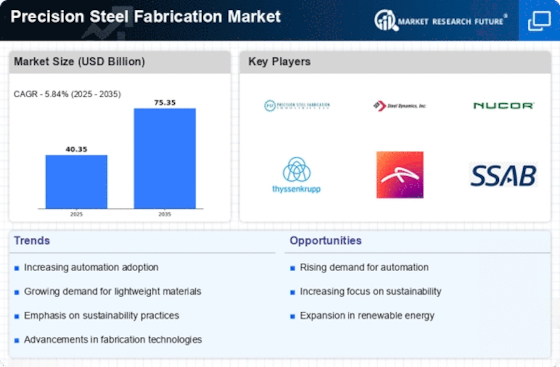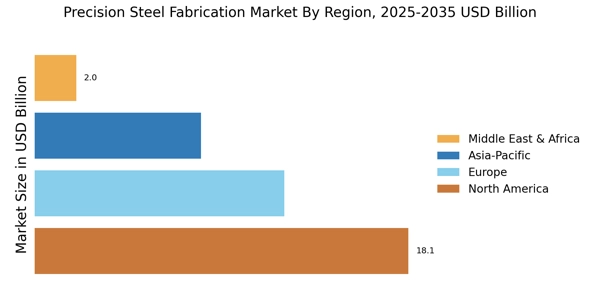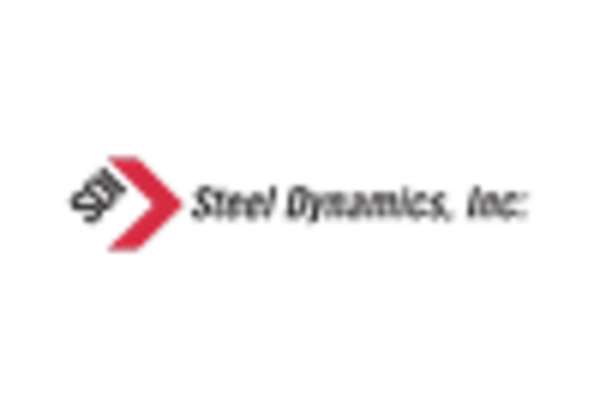Growth in Renewable Energy Projects
The Precision Steel Fabrication Market is poised to benefit from the expanding renewable energy sector. As nations strive to meet energy demands sustainably, investments in wind, solar, and hydroelectric projects are on the rise. Steel fabrication is essential in constructing wind turbine towers, solar panel frames, and other critical infrastructure. Recent estimates suggest that the renewable energy market could grow by over 10% annually, creating substantial opportunities for precision steel fabricators. This growth not only supports the transition to cleaner energy sources but also positions the precision steel fabrication sector as a key player in the global effort to combat climate change. The synergy between renewable energy initiatives and precision steel fabrication is likely to drive market expansion.
Increased Focus on Safety Standards
The Precision Steel Fabrication Market is increasingly influenced by stringent safety regulations and standards. As industries prioritize worker safety and compliance, the demand for high-quality fabricated steel components is rising. Companies are compelled to invest in precision fabrication to ensure that their products meet safety certifications and withstand rigorous testing. This trend is particularly evident in sectors such as automotive, aerospace, and construction, where safety is paramount. The implementation of advanced quality control measures and adherence to international standards can enhance the reputation of fabricators, potentially leading to increased market share. As safety regulations continue to evolve, the precision steel fabrication market is likely to adapt, fostering innovation and quality improvements.
Rising Demand in Construction Sector
The Precision Steel Fabrication Market is experiencing a notable surge in demand, particularly driven by the construction sector. As urbanization accelerates, the need for robust and durable materials becomes paramount. Steel fabrication plays a crucial role in constructing high-rise buildings, bridges, and infrastructure projects. According to recent data, the construction industry is projected to grow at a compound annual growth rate of approximately 5.5% over the next five years. This growth is likely to bolster the Precision Steel Fabrication Market, as companies seek reliable and efficient fabrication solutions to meet the increasing demands of construction projects. Furthermore, the trend towards sustainable building practices may further enhance the market, as precision steel fabrication offers environmentally friendly options that align with modern construction standards.
Emergence of Smart Manufacturing Practices
The Precision Steel Fabrication Market is witnessing a shift towards smart manufacturing practices, driven by the need for efficiency and customization. The integration of Internet of Things (IoT) technologies and data analytics into fabrication processes allows for real-time monitoring and optimization. This transformation enables manufacturers to respond swiftly to market demands and reduce lead times. As a result, precision steel fabricators can offer tailored solutions that meet specific client requirements, enhancing customer satisfaction. The trend towards smart manufacturing is expected to grow, with projections indicating that the market for smart manufacturing technologies could reach USD 400 billion by 2025. This evolution not only improves operational efficiency but also positions the precision steel fabrication sector as a leader in innovation.
Technological Innovations in Fabrication Processes
Technological advancements are significantly influencing the Precision Steel Fabrication Market. Innovations such as automation, robotics, and advanced software solutions are streamlining fabrication processes, enhancing efficiency and precision. For instance, the integration of computer numerical control (CNC) technology allows for intricate designs and reduces material waste, which is increasingly important in a competitive market. The adoption of these technologies is expected to increase productivity by up to 30%, thereby attracting more businesses to invest in precision steel fabrication. Additionally, the rise of Industry 4.0, characterized by smart manufacturing and data analytics, is likely to transform traditional fabrication methods, making them more adaptable and responsive to market needs.


















